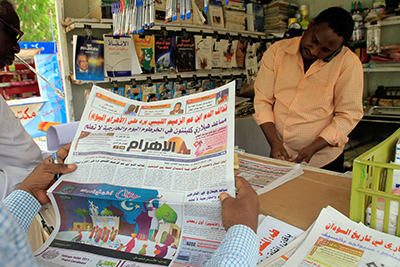The Sudanese government has boasted that its freedom of information law, passed by parliament at the end of January, will increase transparency by giving citizens the right to access and publish public information. But with a long history of censorship and harassment from authorities, journalists suspect the law will be used as another way to suppress them.
Salma Maarouf, a correspondent for the independent Sudanese news website Alyoum Altali, criticized the timing of the law, which was first proposed in 2011. She wrote in an opinion piece that the law had been “at the bottom of the pile” for years, adding: “[They] are trying to use this law as a quick fix to remove the specter of Transparency International’s rankings, which placed Sudan at the bottom of the list of countries as the least transparent.”
When the law was passed, Tahani Abdallah, Minister of Science and Communications, told Al-Jazeera: “The first advantage of this law is that it will raise the ranking of Sudan in Transparency International’s index,” referring to the anti-corruption organization, which ranks Sudan 173 out of 175 on its list of most corrupt countries.
Journalists have also criticized the opaque way the law was passed. Apart from a public hearing in parliament on January 18 that outlined some of the restrictions to the law, no details have been released to the public or press groups.
“How can you pass a law on freedom of information, without releasing any information about it?” Usamah Mohamed, a Sudanese blogger, told the Committee to Protect Journalists. He added: “They made it very clear that a lot of information is going to remain classified. They have codified this law so they can go after the press if they cross the line.”
At the public hearing, Abdallah said that the law, “Represents the basic human rights of freedom of thought and expression.” She added that it would be used to strengthen the relationship between the government and its citizens, and to fight corruption.
However, the law has 12 exceptions under which information will remain classified, according to news reports. These include personal information, information on national security, foreign policy, and criminal procedure. No clear mechanism was discussed at the public hearing as to how information will be categorized, and it will be up to low-level officials to decide, the reports said.
A committee supervised by a minister appointed by the president will oversee freedom of information requests instead of them being sent directly to the relevant ministry, according to news reports. This leaves the executive branch of government with control over access to information, a decision that has been criticized in the press.
While rules granting freedom of information are a step in the right direction in Sudan, several Sudanese journalists and press freedom organizations are wary of how effective it will be, according to journalists who spoke to CPJ and news reports.
Sudan has a history of censorship and other violations of press freedom including intimidation and arrests of journalists, and newspapers being suspended or having editions confiscated by the National Intelligence and Security Services. Government agencies also restricted Internet access during protests in 2013.
According to Al-Jazeera, journalists said they were concerned by restrictions and exceptions to the law. The media outlet said many journalists viewed the law as an attempt by the government to legalize withholding of information and as a tool to increase censorship.
Omar Osman, one of the journalists interviewed by Al-Jazeera, drew attention to how a law described by the government as a way to create transparency was making it harder for journalists to gain access to information. “The government has now allowed itself to get tighter control over information,” he said. “Information that we used to have access to through some employees or sources inside ministries are now forbidden according to this law.”
Mohamad Fadl Ali, editor-in-chief of the news website Sudan Daily Press, told CPJ, “I don’t take this law seriously. There is no hope for real change in Sudan with this current status quo.” He declined to comment further, saying he feared that his phone was being tapped. Journalists in Sudan come under a lot of harassment from authorities, according to CPJ research.
Mohamed, the blogger, described the freedom of information law as “one within a jungle of restrictions” and told CPJ: “They cannot claim to enact a freedom of information law and expect change when there are all these other laws that aim at limiting press freedom.” In Sudan, the national security law, the press law, the cybercrime law, and contrived legal proceedings have been used to target journalists and publications.
